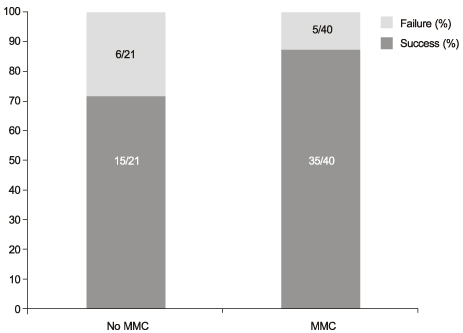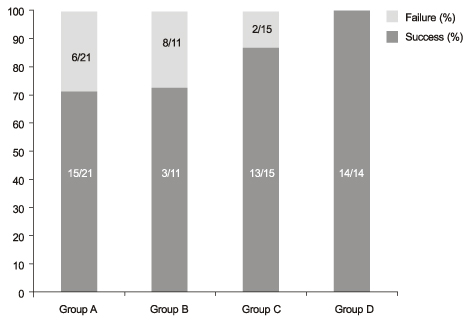J Korean Ophthalmol Soc.
2012 Sep;53(9):1231-1235. 10.3341/jkos.2012.53.9.1231.
The Effect of Mitomycin C Instillation after Silicone Intubation in Adult Partial Nasolacrimal Duct Obstruction
- Affiliations
-
- 1Department of Ophthalmology, Chonbuk National University Medical School, Jeonju, Korea. ahnmin@jbnu.ac.kr
- 2Research Institute of Clinical Medicine of Chonbuk National University-Biomedical Research Institute of Chonbuk National University Hospital, Jeonju, Korea.
- KMID: 2216074
- DOI: http://doi.org/10.3341/jkos.2012.53.9.1231
Abstract
- PURPOSE
To compare the result of mitomycin C (MMC) instillation after silicone intubation in partial nasolacrimal duct obstruction in adults according to duration of instillation.
METHODS
An instillation of 0.04% MMC eyedrops was performed on 61 eyes of 38 patients diagnosed with partial nasolacrimal duct obstruction. The clinical result of patient groups, classified according to duration of MMC eyedrops instillation, was analyzed prospectively. The patients groups was as follows: no MMC eyedrop instillation (group A), 1 week of MMC instillation (group B), 2 weeks of MMC instillation (group C), and 3 weeks of MMC instillation (group D).
RESULTS
Among all patients, 50 eyes (81.9%) showed improved symptoms. Fifteen eyes (71.4%) in group A, 8 eyes (72.7%) in group B, 13 eyes (86.7%) in group C and 14 eyes (100.0%) in group D had a successful outcome. The success rate was observed in groups D, C, B, and A, in descending order, which was statistically significant (p = 0.025).
CONCLUSIONS
Silicone intubation is an effective treatment option for partial nasolacrimal duct obstruction in adults and MMC eyedrop instillation may improve silicone intubation results.
MeSH Terms
Figure
Reference
-
1. Gibbs DC. New probe for the intubation of lacrimal canaliculi with silicone rubber tubing. Br J Ophthalmol. 1967. 51:198.2. Keith CG. Intubation of the lacrimal passages. Am J Ophthalmol. 1968. 65:70–74.3. Oum JS, Park JW, Choi YK, et al. Result of partial nasolacrimal duct obstruction after silicone tube intubation. J Korean Ophthalmol Soc. 2004. 45:1777–1782.4. Hayasaka S, Noda S, Yamamoto Y, Setogawa T. Postoperative instillation of low-dose mitomycin C in the treatment of primary pterygium. Am J Ophthalmol. 1988. 106:715–718.5. Frucht-Pery J, Siganos Cs, Ilsar M. Intraoperative application of topical mitomycin C for pterygium surgery. Ophthalmology. 1996. 103:674–677.6. Chen CW. Enhanced intraocular pressure controlling effectiveness of trabeculectomy by local application of mitomycin-C. Trans Asia Pac Acad Ophthalmol. 1983. 9:172–177.7. Bergstrom TJ, Wilkinson WS, Skuta GL, et al. The effects of subconjunctival mitomycin-C on glaucoma filtration surgery in rabbits. Arch Ophthalmol. 1991. 109:1725–1730.8. Lee KS, Byun YJ. Dacryocystorhinostomy with intraoperative mitomycin C. J Korean Ophthalmol Soc. 1998. 39:1909–1914.9. Kim YT, Chung WS. The effect of mitomycin C in endonasal dacryocystorhinostomy. J Korean Ophthalmol Soc. 2002. 43:728–732.10. Lee JM, Lee YJ, Kim JH. The effect of mitomycin C concentration in endonasal dacryocystorhinostomy. J Korean Ophthalmol Soc. 2004. 45:1609–1614.11. Song BY, Kim JD, Kim S. Silicone intubation and postoperative mitomycin application for partial nasolacrimal duct obstruction in adults. J Korean Ophthalmol Soc. 2005. 46:16–21.12. Kim DS, Lee YJ. Efficacy of silicone nasolacrimal intubation with mitomycin C treatment for treatment of incomplete nasolacrimal duct obstruction. J Korean Ophthalmol Soc. 2006. 47:181–185.13. Jones LT. An anatomical approach to problems of the eyelids and lacrimal apparatus. Arch Ophthalmol. 1961. 66:111–124.14. Lamping K, Levine MR. Jones' tubes. How good are they? Arch Ophthalmol. 1983. 101:260–261.15. Paulsen FP, Thale AB, Maune S, Tillmann BN. New insights into the pathophysiology of primary acquired dacryostenosis. Ophthalmology. 2001. 108:2329–2336.16. Lee HC, Chung WS. Success rate of endonasal dacryocystorhinostomy. J Korean Ophthalmol Soc. 1996. 37:211–218.17. Kim DM, Roh KK. Results with silicone stent in lacrimal drainage system. J Korean Ophthalmol Soc. 1987. 28:733–735.18. Lee SH, Kim SD, Kim JD. Silicone intubation for nasolacrimal duct obstruction in adult. J Korean Ophthalmol Soc. 1997. 38:185–189.19. Park HJ, Hwang WS. Clinical results of silicone intubation for epiphora patients. J Korean Ophthalmol Soc. 2000. 41:2327–2331.20. Jeong JG, Ahn M. Comparison of Dacryocystographic results before and after silicone intubation in incomplete nasolacrimal duct obstruction. J Korean Ophthalmol Soc. 2011. 52:1–6.21. Kao SC, Liao CL, Tseng JH, et al. Dacryocystorhinostomy with intraoperative mitomycin C. Ophthalmology. 1997. 104:86–91.22. Yalaz M, Firinciogullari E, Zeren H. Use of mitomycin C and 5-fluorouracil in external dacryocystorhinostomy. Orbit. 1999. 18:239–245.23. Lee TS, Rhee K. The effect of mitomycin-C eyedrop on prevention of internal ostium obstruction after endonasal dacryocystorhinostomy. J Korean Ophthalmol Soc. 1998. 39:1915–1920.24. Gilman AG, Goodman LS, Gilman A. The Pharmacological Basis of Therapeutics. 1980. 6th ed. New York: Macmillan Publishing Co.;1295–1300.25. Kunitomo N, Mori S. Studies on the pterygium. Part 4. A treatment of the pterygium by mitomycin-C instillation. Acta Soc Ophthalmol Jpn. 1963. 67:601–607.26. Liao SL, Kao SC, Tseng JH, et al. Results of intraoperative mitomycin C application in dacryocystorhinostomy. Br J Ophthalmol. 2000. 84:903–906.27. Camara JG, Bengzon AU, Henson RD. The safety and efficacy of mitomycin C in endonasal endoscopic laser-assisted dacryocystorhinostomy. Ophthal Plast Reconstr Surg. 2000. 16:114–118.28. Liu D, Bosley TM. Silicone nasolacrimal intubation with mitomycin-C: a prospective, randomized, double-masked study. Ophthalmology. 2003. 110:306–310.29. Rubinfeld RS, Pfister RR, Stein RM, et al. Serious complications of topical mitomycin-C after pterygium surgery. Ophthalmology. 1992. 99:1647–1654.30. Anduze AL, Burnett JM. Indications for and complications of mitomycin-C in pterygium surgery. Ophthalmic Surg Lasers. 1996. 27:667–673.31. Rozenman Y, Frucht-Pery J. Treatment of conjunctival intraepithelial neoplasia with topical drops of mitomycin C. Cornea. 2000. 19:1–6.32. Frucht-Pery J, Sugar J, Baum J, et al. Mitomycin C treatment for conjunctival-corneal intraepithelial neoplasia: a multicenter experience. Ophthalmology. 1997. 104:2085–2093.
- Full Text Links
- Actions
-
Cited
- CITED
-
- Close
- Share
- Similar articles
-
- Results with Silicone Stent in Lacrimal Drainage System
- Silicone Tube Intubation in Acquired Nasolacrimal Duct Obstruction
- Result of Partial Nasolacrimal Duct Obstruction After Silicone Tube Intubation
- Silicone Intubation for Nasolacrimal Duct Obstruction in Adult
- Comparison of Dacryocystographic Results Before and After Silicone Intubation in Incomplete Nasolacrimal Duct Obstruction



